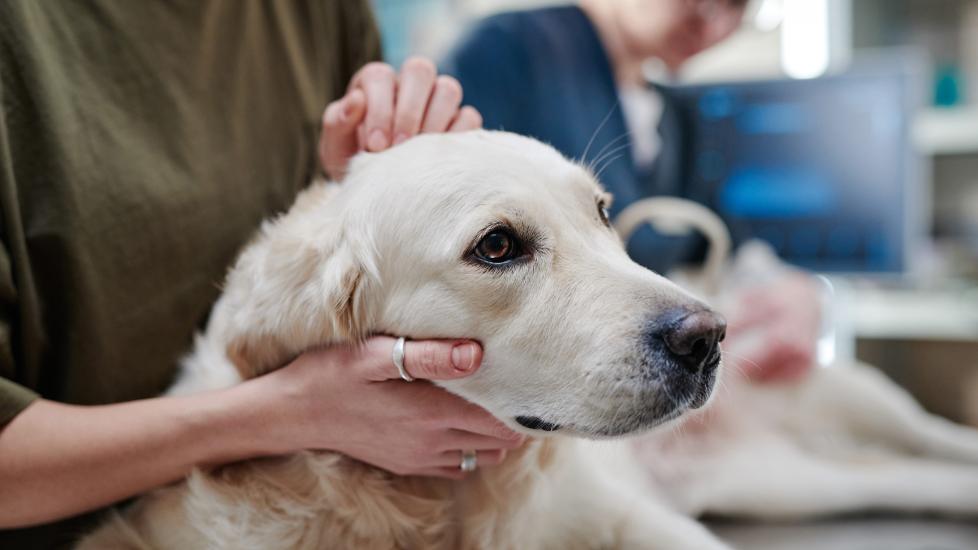Head Pressing in Dogs: Causes, Diagnosis, and Treatment
AnnaStills/iStock / Getty Images Plus via Getty Images
Some dogs may physically press their head into you affectionately when you’re giving them attention. This sign of affection is typically not anything to worry about. In fact, you should enjoy it because it’s adorable!
But if you’ve noticed your dog pressing their head into abnormal locations, such as the wall or a piece of furniture, this could be a symptom of a serious medical issue that you shouldn’t ignore.
Health Tools
Not sure whether to see a vet?
What Is Head Pressing in Dogs?
Head pressing in dogs refers to a compulsive behavior in which a dog presses their head against a wall, furniture, or other object. While walls and room corners are common, the dog may press their head into any firm, stationary object. The dog usually stands on all four legs with their forehead pressed against the solid surface.
Head pressing in dogs is usually a sign of neurological disease. The behavior can occur in dogs of any breed, size, sex, or age. If you notice your dog exhibiting this symptom, contact your vet immediately.
Why Is My Dog Pressing Their Head?
The exact reason why a dog with a neurological disease presses their head against objects is currently unknown.
Published research isn’t clear on why dogs with neurological conditions do this. One theory is that the dog is experiencing discomfort or pain and pressing their forehead onto a hard surface provides relief from the sensation. Another theory is that the dog’s consciousness or awareness is altered. For example, it’s possible that they walk into the wall and can’t figure out how to turn away.
Other Symptoms Associated with Head Pressing in Dogs
Head pressing is a symptom of other neurological conditions. Other signs may include:
-
Behavioral changes such as increased aggression, acting aloof, or not responding to commands
-
Walking in circles and/or pacing
-
Impaired reflexes
-
Blindness or other vision problems
-
Abnormal eye movements (nystagmus) or variations in pupil size
-
Neck pain and rigidity
-
Partial paralysis of the face or limbs
How Veterinarians Diagnose Head Pressing in Dogs
Your veterinarian may witness head pressing during your dog’s appointment; however, dogs may not demonstrate the symptom while they are there.
If you’re concerned that your dog is head pressing, it’s a good idea to take photos or videos of your dog performing the behavior in case they don’t repeat it while in the veterinary appointment.
Your veterinarian will be more interested in figuring out what’s causing the head pressing. To investigate the underlying cause, the following diagnostics may be recommended:
-
Blood and urine testing
-
Fundic examination (looking at retina and other structures in the back of the eye)
-
Head X-rays
-
CT scan of the head
-
MRI of brain and spinal cord
-
Testing of cerebrospinal fluid
Is There a Treatment for Head Pressing in Dogs?
Some causes of head pressing in dogs are treatable, but treatment varies widely depending on what’s causing the behavior. For example, some tumors may be managed with surgery, radiation therapy, or chemotherapy.
Some tick-borne illnesses can be managed with antibiotics, while fungal infections may need antifungal therapy. Autoimmune illnesses may improve with steroids and other immunosuppressive therapies. However, some conditions that cause head-pressing, such as rabies (highly unlikely in a vaccinated dog), are fatal.
Treatments may also be aimed at managing symptoms. This could include medications for pain and inflammation like carprofen or other NSAIDs, prednisone or other steroids, or opioids. Dogs experiencing seizures may have these controlled with medications such as phenobarbital or levetiracetam.
Your veterinarian may also recommend medications to give in case your dog has an active seizure at home, like diazepam to be given rectally. Uncontrolled seizures can result in brain damage, high body temperature (hyperthermia), or death.
Managing a Dog’s Life with Head Pressing
If your dog is head pressing, get them evaluated by a veterinarian immediately.
Once your pup is home, considerations for their ongoing management may include:
-
Ensuring areas that they’ve been head pressing in are free of hazards
-
Providing non-slip pads if they’re having trouble walking
-
Restricting access to stairs by using a pet gate
-
Comfortable beds for resting
-
Ensuring your veterinarian has given you emergency doses of anti-seizure medications, if necessary
Head pressing is a serious symptom. Though some causes, such as liver shunts in puppies, may be treatable with a good prognosis, many causes carry a poor prognosis, especially in senior dogs.
Some causes of head pressing in dogs are treatable, but treatment varies widely depending on what’s causing the behavior.
Keep in mind that if your dog is head pressing, they likely have severe disease affecting their brain. Your veterinarian is your best source for ensuring you’re providing a good quality of life to your dog.
FAQs:
Is head pressing more common in senior dogs?
Although head pressing can occur in a dog of any age, head pressing is commonly associated with brain tumors in senior dogs.
Can a dog recover from head pressing?
Some causes of head pressing, such as liver shunts causing hepatic encephalopathy in puppies, may be treatable. However, many causes of head pressing are very serious. Though symptoms may improve with treatment, many causes are not curable.
